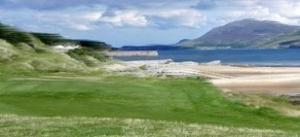If you happened into Good Shepherd on Sunday you would have heard a little discussion of What Kind of loathsome sores Job had the misfortune to be afflicted with. Or rather, that fascinating question was raised by the curious crowd but Matt, cowardy custard, decline to answer it. Instead he recalled an infamous sermon of family lore–that time my mom and dad went to Ireland and went to church and learned A Lot about leprosy from the pulpit of a vicar who managed to forget about the healing part. My mother graciously assented to let me have the excerpt for you. You can read the whole post at her blog, Asking for the Road. This one is under Travels Out Of Africa. But you should go through and read everything that she’s written.
It’s ten o’clock in the morning, and we have just waded through a heavy breakfast at Croaghross—a small five-bedroom hotel in Portsalon, overlooking Lough Swilly in County Donegal, Ireland. I have come a long way to reach this gemstone island, while the ashes of my mother lie in a grave far away across the sea and beyond—far across thousands of miles of hill and prairie, mountain and river.
Bob and I are on our end-of-summer journey back to West Africa—from Oregon to Ivory Coast—Portland to Abidjan. But I am so exhausted by air travel. Wouldn’t it be better, I wistfully imagine, to travel over the seas by boat like we did when I was very young—to float around on the ocean, surrounded by a nice, safe, watertight hull? Wouldn’t it be better than to fly so high and perhaps fall so far in a blaze of flame and exploding metal? Wouldn’t it be better to spend five days walking the decks of a ship than to spend six or eight hours jammed into a tight seat in economy class? “Shakespeare in Love” simply didn’t provide enough entertainment and distraction to put the thought out of my mind that things were better in the olden days.
But about breakfasts at this hotel in Ireland: As I started to say, they seem to consist of everything that could possibly fit into the category of morning food. This amounts, on the conservative side, to orange juice, cereal and fruit, scones, toast and marmalade, eggs, bacon and sausage, with lashings of tea or coffee, and possibly black or white “pudding”, containing things that I suspect, but fear to know about. That is the short list. The longer list also includes apple juice, summer fruits, potato bread, porridge or muesli, grilled tomatoes, mushrooms, and—I must’ve forgotten something—yoghurt.
If we forge our way through a large breakfast around nine, then the only thing to do about lunch is show a proper disdain, and get by till dinner in the evening with just a cup of tea and perhaps some fruit in mid-afternoon. Of course this kind of morning meal requires a pre-breakfast walk, and plenty of exercise afterwards.
Last Sunday, we got through one such bountiful breakfast and decided to put the calories to good use by walking to the local Church of Ireland. The church was small but nicely put together with stained glass, hard benches, and very hard kneelers.
The minister, who on first glance seemed to rejoice in a full head of black hair, couldn’t fool us. He was seventy years old at least—yea even eighty—and as wrinkled as a prune. In the manner of vain old men, he had grown his hair long enough on one side of the head to part it from the short wisps around his ears, and then had combed it back, well-dyed, over the top where it lay rigidly pasted down to withstand anything but gale-force winds—as if somehow the congregation could be conned into believing that he wasn’t as old as the hills or that he was growing old gracefully.
So, having contemplated the appearance of the minister and sung a hymn, and heard a reading from the Gospel of St. Luke on the healing of the ten lepers, we settled into our hard benches for the sermon.
It was a new experience in sermons, and the minister, a chatty old boy, clearly enjoyed his weekly chance to wax eloquent. He began by reminding us that this was the very anniversary of some day or other from the World War II, and made references to Chamberlain who came back from seeing Adolf Hitler with the famous phrase “peace in our time”, just before everyone got around to realizing that definitely there was no peace.
So I said to myself on my hard bench, “This is a topical sermon due to a semi-anniversary of war and/or subsequent peace. Nothing about the miracle of healing that Jesus performed.”
But no….
As it turned out, the question of disease (if not healing) was to come. The subject of lepers and leprosy was weighing on the ministerial mind, and he had a sheaf of notes. With relish he turned to the next page. He would go on, he said, into the subject of leprosy in some detail. (I could see in my mind’s eye old medical tomes piled all over his sitting room.)
Leprosy, he said, comes in two kinds—the lumpy and the other kind that attacks the nerves. Either way, we were given to understand in frightening and ghastly detail, how the sufferer ends up hobbling around on stumps and having no fingers or hands left to speak of—and this can even lead to “testicular involvement” and sterility, and the loss of great wads of flesh—something we’d all been longing to know. “Pus, after all,” said the preacher (pronouncing it “puss”) “is just liquefied flesh.”
We, the congregation, were transfixed. Even the children. There was no squirming to distract any one of us from the horrid revelations of what could possibly go wrong should we come down with leprosy. And there was nothing in the sermon to remind us that Jesus healed ten lepers, or that at least one of them came back to say thank you. Nor did the preacher seem to know (as any good Biblical Commentary could have told him) that the word used for leprosy in the Bible referred to skin diseases other than the leprosy known today.
So what was the point? To this day I cannot decide. The sermon concluded with a waving of the ministerial hands in signals of VE and VJ. “Victory in Europe” and “Victory over Japan” after which we sang, “Now thank we all our God.” And thankful we were. We thanked God and went out smiling and nodding to each other and to the preacher who seemed grateful in turn for such attentive worshippers.
The preacher, glorying in his oratory, never realized that after such an onslaught his hearers were definitely not in the mood for lunch, or possibly even dinner, and might even hesitate before taking on another big breakfast.













